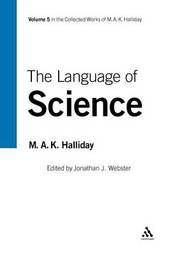
|
Language of Science: Volume 5
Paperback / softback
Main Details
| Title |
Language of Science: Volume 5
|
| Authors and Contributors |
Edited by Jonathan J. Webster
|
|
By (author) M.A.K. Halliday
|
| Series | Collected Works of M.A.K. Halliday |
|---|
| Physical Properties |
| Format:Paperback / softback | | Pages:268 | | Dimensions(mm): Height 234,Width 156 |
|
| Category/Genre | linguistics
Philosophy of science |
|---|
| ISBN/Barcode |
9780826488275
|
| Classifications | Dewey:501.4 |
|---|
| Audience | | Undergraduate | | Postgraduate, Research & Scholarly | | Professional & Vocational | |
|---|
|
Publishing Details |
| Publisher |
Bloomsbury Publishing PLC
|
| Imprint |
Continuum International Publishing Group Ltd.
|
| Publication Date |
19 June 2006 |
| Publication Country |
United Kingdom
|
Description
'Halliday's investigations into grammatical metaphor take us deeply into the way we construct and expand meanings, starting with representations of concrete experienced events and ending with theoretical worlds populated by abstract entities linked through generalized relations and causalities. He finds these processes most strikingly in the development of the modern sciences that have historically created robust virtual worlds of theory from observable material events. He sees the same processes of grammatical metaphor as children learn to participate in our built symbolic environment, particularly as they are introduced to these meaning systems in schools, an institution designed expressly for that purpose.' Professor Charles Bazerman, University of California, Santa Barbara.
Author Biography
Professor Jonathan J. Webster is Head of the Department of Chinese, Translation and Linguistics at the City University of Hong Kong. He is also the Managing Editor of the International Linguistics Association's journal WORD, and the editor of the forthcoming Journal of World Languages (2014). M.A.K. Halliday was Emeritus Professor of Linguistics at the University of Sydney.
Reviews'Halliday's investigations into grammatical metaphor take us deeply into the way we construct and expand meanings, starting with representations of concrete experienced events and ending with a theoretical worlds populated by abstract entities linked through generalized relations and causalities. He finds these processes most strikingly in the development of the modern sciences that have historically created robust virtual worlds of theory from the observable material events of the world. But he sees these same processes in all the meaning systems of modern life, whether law, bureaucracy, economics, or arts. He sees the same processes of grammatical metaphor as children learn to participate in our built symbolic environment, particularly as they are introduced to these meaning systems in schools, an institution designed expressly for that purpose. The linguistic mechanisms Halliday identifies are congruent with Vygotsky's studies of how words come to direct our minds and perception, as individuals and societies. He shares with Vygotsky an understanding of how schooled or scientific concepts re-form the spontaneous concepts of everyday activity to sublate prior experience into higher degrees of abstraction. Both provide related accounts of how cultural history becomes embedded in the complex languages used in scientific, disciplined, or other cultural settings, so that we learn to think with the tools culture provides us, using our own aptitude for metaphorical thinking.' Professor Charles Bazerman, University of California, Santa Barbara. * Blurb from reviewer * 'These four volumes (4, 5, 6 and 7) venture into remarkably diverse fields. How one man could master the minutiae of all these areas of linguistic research is a matter for wonder and admiration. As a linguistic polymath, Halliday far outstrips all contemporaries...One need look for no further explanation of Halliday's current stature as doyen of British linguistics. The publication of Halliday's complete papers is an important contribution to scholarly documentation.' -- Roy Harris * Times Literary Supplement *
|